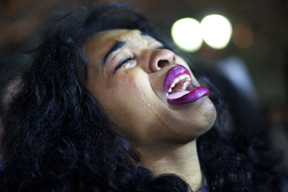American mining giant Freeport-McMoRan is paying the same local police who have used violence against mine workers asking for better wages

Indonesia police clash with workers of mining giant Freeport-McMoran during a protest on October 10. Indonesian security forces fired on striking workers at Freeport-McMoran's gold and copper mine after a protest turned violent early Monday, killing one, officials said. / AP
JAKARTA, Indonesia -- Up in the remote mountains of West Papua, Indonesia, a road winds along steep cliffs, tall trees, and security checkpoints to the world's richest copper and gold mine. More than four thousand meters above sea level, the mine is said to be so high that its mining trucks must be tracked via satellite, as clouds typically cloak them from view. Adding to the isolation, the American mining company, Phoenix-based Freeport-McMoRan, rarely allows visitors to enter its facilities. The access road is for official vehicles only, and foreign journalists are almost exclusively forbidden.
Yet despite its cover, Freeport's giant Grasberg mine is on high alert. Production there has ground to a near halt as 8,000 workers strike for better wages, currently set between $1.50 and $3 an hour. Now in its third month, this strike is not only the longest in Indonesian mining history, but also one of the more violent, with sabotage to pipelines and deadly attacks on company employees. "We don't feel secure to work at Freeport or to travel between the mine and our homes," said Juli Parorrongan, a spokesman for the All Indonesian Workers Union, which organized the strike. "Too many people have been killed, but we don't know who's shooting us. We need the police to protect us."
Freeport-McMoRan is one of the world's largest mining companies, with interests across the globe and just under $19 billion in revenue in 2010. The Grasberg mine, which holds the world's largest gold reserves, has been so profitable that Freeport is the Indonesian government's biggest single taxpayer, with about 1.75 billion in taxes and royalties last year alone. An analyst for Forbes.com projected the protests may cost the firm $250 million in revenue; a company spokesperson cited daily losses of $18 million to $19 million.
The strikers have a reason to be wary for their safety: Freeport is paying millions of dollars directly to the police officers who guard its mine, although Indonesia's police force has a history of brutality and corruption. When the National Police chief admitted to these payments last month, he called it "lunch money," writing it off as "operational funding given directly to police personnel to help them make ends meet." A 2005 investigation by the New York Times found that individual military commanders had received tens of thousands of dollars, in one case up to $150,000, from Freeport. Ironically, the mining company allowed the officers to eat lunch (and breakfast and dinner) in the company mess hall.
Rights organizations fear the security payments are tainting police neutrality in the region, creating a conflict of interest for officers who are legally bound to protect the Indonesian people. "If they receive money from Freeport, it means their boss is not the Indonesian government, but rather Freeport -- a private company," said Poengky Indarti, executive director of the Indonesian Human Rights Monitor. "With this money, we worry that police tend to protect Freeport rather than protecting the workers."
In October, police officers opened fire on striking Freeport workers who were trying to board Freeport buses from the nearby town of Timika to demonstrate by the mine's gate. One striker died from gunshot wounds, at least six were injured, and a security officer later died from injuries sustained in the clash.
Freeport has given $79.1 million to police and military forces in the past 10 years, according to a group called Indonesian Corruption Watch. Most of that funding has been through in-kind contributions such as food, housing, fuel, and travel costs, but officers have also received direct payments. A report by the NGO Global Witness shows that, between 2001 and 2003, Freeport gave nearly $250,000 to a controversial commander who in 1999 led military action in East Timor, where soldiers killed more than a thousand people.
Since then, the security funding has grown: Freeport's financial documents show that the company paid $14 million to support government security forces in 2010, up from $10 million in 2009 and $8 million in 2008.
Eric E. Kinneberg, Director of Communications for Freeport, wrote in an email, "This provision of support is consistent with our obligations under our agreements with the respective governments, our philosophy of responsible corporate citizenship and the Voluntary Principles on Security and Human Rights. We periodically review our support practices to ensure that they are appropriate, lawful and properly controlled." Of the 2010 funding, he emphasized that "approximately 80% of that amount is non-cash, in-kind support" that is "necessitated by the remote posting."
The Guards of Grasberg
Even under normal circumstances, Freeport's Grasberg mine requires an unusually high level of security. Situated in the restive province of West Papua, the mine has long been a site of mysterious shootings by unidentified gunmen, and instances of violence have risen since the strike began in September. On November 18, gunmen wounded three police officers and killed a security officer with a shot to the head. Since early October, at least four workers and two residents have also been shot and killed by unknown gunmen near the main road.
- 1
- 2
- Single Page




















 In Focus
In Focus
Join the Discussion
After you comment, click Post. If you’re not already logged in you will be asked to log in or register.
blog comments powered by Disqus